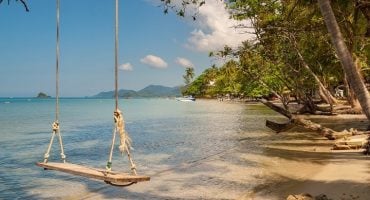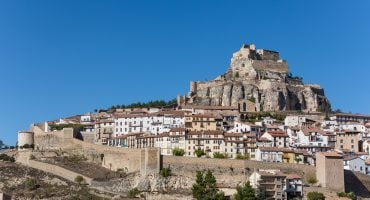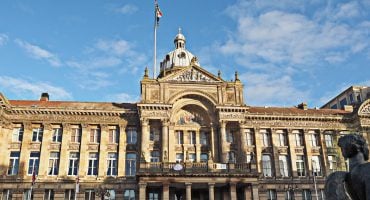Fall under Morocco’s spell — a magical country where ecotourism goes hand in hand with a wealth of cultural and natural resources and commitment to a sustainable future.
Beyond its breathtaking landscapes, this country also offers a unique experience where culture and tradition play a crucial role. Indulge in delicious dishes made with local ingredients, stay in eco-friendly accommodation and admire the talent of craftspeople who uphold the age-old techniques of their ancestors. Delve into exciting festivals celebrating Moroccan traditions.
What’s more, Morocco is known for continuously striving for sustainable development, protecting its natural wonders for future generations. See Morocco from a new angle through its booming ecotourism business. Follow the guide!
Cuisine bursting with both colour and flavour
Morocco offers a mouth-watering range of specialties and products, reflecting its rich, diverse and colourful culture.
Specialties to try
The country will have you drooling over a tantalising range of pastries, such as the sweet and savoury pastilla made with meat or seafood and dusted with icing sugar and cinnamon. And there’s also the famous Makrout, also known as cornes de gazelle (gazelle horns). Or why not try M’hanncha, a “snake” made of a thin layer of puff pastry and filled with almond paste.
Enjoy it with a nice and refreshing mint tea or an amlou — a concoction of almonds, argan oil and honey.
Must-have spices
Cinnamon and almond are exceedingly common in Moroccan dishes. Spices are key to Moroccan cuisine and add a distinctive character to its dishes and drinks. Two of Morocco’s most iconic spices are cumin and cinnamon. Saffron, which is precious and refined, enriches dishes with its unique colour and flavour. And then, of course, there’s ras el hanout, an iconic spice blend often found in couscous. The combination of these spices shows the historical impact and influence the region has had on the culinary arts.
Local products to try
Of all the local products, argan oil is the star of the show. You can find bottles of it in its pure form, ready to be taken home. But it also features in dishes, drinks and beauty products. You should also sample local dates for a sweet snack and a burst of energy. If you prefer something savoury, try the tasty olives (black, green, marinated or served with other condiments).
Locals’ sense of hospitality
All of Morocco’s simple, fragrant, colourful and unique products would not be half as appreciated as they are without the deep-rooted sense of hospitality from locals, which is a precious virtue in Moroccan culture. Ecotourism in Morocco also involves spending time with the locals and sharing their culture. Meals are designed to be shared as a family or between friends, symbolising social connection and inter-generational bonds. The meticulous preparation of dishes like couscous and tajine requires people to work together and share the work. Every aspect of Moroccan cuisine, from the ingredients to the traditional cooking methods, is living proof of just how important hospitality and traditions connecting people through food are.
Responsible and alternative accommodation
Ecotourists in Morocco favour eco-friendly accommodation, with plenty of options throughout the country. There are loads of initiatives combining local traditions, the latest innovations and eco-friendly practices.
“Green Key” ecolabel
Morocco’s “Green Key” ecolabel is a commitment to promote sustainability and protect the environment. This initiative aims to recognise and reward tourist establishments with practices that respect nature and local communities. Places with this label take ecological measures such as ensuring efficient water and energy management, reducing waste production and opting for sustainable materials. This label reflects Morocco’s desire to promote sustainable tourism while offering travellers a memorable and eco-friendly experience.
Stay with the locals
What could be more eco-friendly than staying with the locals? These stays will allow you to experience local culture from the inside, while also reducing your environmental footprint. Hosts involve their guests in their day-to-day lives and activities, such as preparing meals. It’s moments like these that encourage communication and produce unique experiences. You’ll leave with a deeper understanding of the country’s environmental and social challenges from the plentiful conversations you’ll have had with the locals and your own insights from observing their way of life.
Ecolodges
Ecolodges are a way to get behind Morocco’s ecotourism. They offer comfortable accommodation whilst also protecting nature and the environment. They’ll afford you a sustainable stay with eco-friendly practices and conservation initiatives at the fore. Here are some of the country’s ecolodges:
- La Pause, nestled in the Agafay Desert, offers a secluded retreat with elegant Amazigh tents, organic meals and an eco-friendly approach to have as little impact on the surrounding landscape as possible. The ecolodge also offers cultural and craft workshops and cooking classes about how to make local dishes;
- Dar Itrane is a refuge in the Dadès Valley and showcases a stone and earth construction that blends beautifully with the natural surroundings. You’ll be able to meet local people and help the village of Imelghas prosper;
- Tighremt Assif Melloul is an ecolodge in the Assif Melloul Valley in Morocco and is a Green Key site. You can spend the night in a bivouac way up the Massif du Kousser, with breathtaking panoramic views.
Socially responsible and eco-friendly riads
There are various socially responsible and eco-friendly riads in Morocco that offer quality accommodation and are committed to supporting local communities and environmental practices. They include:
- 72 in Marrakech: This eco-friendly riad boasts elegant rooms and supports social projects in local neighbourhoods. Part of the profit made from the riad is donated to social and community initiatives in the city;
- Dar Kleta in Essaouira: This riad is warm and comfortable, adopts waste-reduction initiatives and uses local organic ingredients in the kitchen;
- Cascades d’Ouzoud in Ouzoud: This riad promotes ecotourism and allows you to be at the heart of nature. An authentic Amazigh village with traditional architecture and opportunities to partake in outdoor activities as close to the waterfalls as it’s possible to get;
- Ksar Ighnda in Ouarzazate: This is a luxury riad in an oasis in the Amazigh village of Aït-Ben-Haddou, 30 kilometres from the city of Ouarzazate. It adopts eco-friendly practices, such as using local and traditional materials, managing water and energy usage, and promoting organic and artisanal products.
Unique craftsmanship and skills
Ecotourism in Morocco also encompasses local crafts. The remarkable skills on display in Morocco showcase the wealth of its culture and heritage. Over the generations, Moroccan craftspeople have developed unique skills in various fields. Their clay work produces beautiful pottery and coloured tiles. Moroccan craftspeople skilfully transform clay into functional and decorative items. Another impressive skill is the creation of hand-woven rugs with expertise passed down from generation to generation. Each rug is the fruit of meticulous work, with techniques varying between regions in line with their own local traditions. Make sure to check out the Moroccan ceramics with geometric and floral patterns that adorn the insides of Moroccan buildings and have become emblems of local craftsmanship. Similarly, wrought iron is transformed into lamps or architectural detailing, combining practicality and aesthetics.
Leather is also prominent in Moroccan craftsmanship. Morocco’s souks and markets are full of leather items, from babouche slippers to bags, as well as other refined, durable and stunning items. Speaking of stunning, Morocco’s traditional clothes and jewellery showcase just what the country’s artisans can do. They embody the mix of cultures that characterises the country, with complex patterns and artisanal detailing. They reflect the country’s cultural identity, history and artistic creativity.
A wide variety of festivals and moussems
Morocco offers a richly diverse range of festivals and moussems all year round that celebrate the country’s culture, heritage and creativity. Over the course of the year, these events offer a unique opportunity to immerse yourself in the country’s rich culture and contribute to local economic and cultural development. Here are just some of them — you should find something that ticks all your boxes:
- Eco Trail Morocco in Ouarzazate in April: This sporting event combines trail running with environmental awareness. Participants follow natural trails, while learning about environmental conservation and supporting sustainable practices. It’s an opportunity to promote an active lifestyle that conserves nature, while exploring the beautiful landscapes the Ouarzazate region has to offer;
- International Nomad Festival in M’hamid El Ghizlane in late April/early May: This is a celebration of Morocco’s nomadic culture through artistic performances, such as traditional dances, music and craft exhibitions. You’ll be able to experience that nomadic culture by meeting the locals and exploring their traditions and crafts, immersing yourself in the desert way of life;
- Rose Festival in Kelaat M’Gouna in May: This festival celebrates the rose harvest in the M’Gouna Valley. Take in colourful parades, traditional dances, craft exhibitions and other cultural events that highlight the local culture and just how important roses are to the area. You can even get involved with local traditional customs by experiencing the age-old tradition of harvesting roses!
- Gnaoua World Music Festival in Essaouira in June: This internationally renowned musical event celebrates Gnaoua music, a Moroccan style with influences from African and Arab traditions. The festival features outdoor concerts, collaborative performances between local and international artists, workshops, talks and art exhibitions;
- Fez Festival of World Sacred Music in September: This festival brings together artists with different cultures and religions from around the world to celebrate spiritual music and intercultural dialogue. The festival features musical performances, sacred songs, ceremonial dances and talks on spirituality and tolerance;
- Taragalte Festival in M’hamid El Ghizlane in October: This festival showcases desert peoples’ traditions and lifestyle, offering an inside look at Saharan heritage. Musical performances, demonstrations of local craftmanship and getting to meet the locals make the Taragalte Festival a unique opportunity to learn about life in the desert and to appreciate the cultural riches the region has to offer!
Sustainable development in Morocco
Morocco has really got behind sustainable development through several initiatives and projects.
Energy resources are managed through initiatives such as the Tétouan wind farm and the Noor solar plant in Ouarzazate, which help produce clean and renewable energy. Water management and the fight against deforestation are priorities, with programmes to ensure efficient water use (especially in eco-friendly housing) and to protect fragile forest ecosystems. The Responsible Tourism Awards recognise initiatives that incorporate eco-friendly and ethical practices into the tourism industry, thereby promoting a more sustainable travel model.
The “Forests of Morocco 2020–2023” strategy reinforces the country’s commitment to sustainable forest management and biodiversity conservation. The strategy aims to combat the degradation of forest resources and to improve sustainable forest management practices. By the end of 2022, over 72,000 ha of trees had been replanted in the country’s forests and a further 52,000 ha should be planted by the end of the year.
These efforts demonstrate Morocco’s commitment to promoting sustainable development with a comprehensive approach, from producing clean energy to preserving and protecting the natural environment and promoting responsible tourism. These initiatives show how Morocco is integrating sustainability objectives into different areas to create a more eco-friendly and socially responsible future. An example to follow!
Book your ticket for an unforgettable ecotourism experience in Morocco and get swept away by the magic and unique hospitality of this country that is ahead of the curve when it comes to environmental responsibility!












